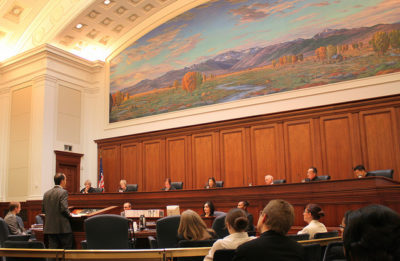It’s Environmental Law Week at the California Supreme Court
Justices to Hear Oral Arguments in Three Major Environmental Cases This Week
 The California Supreme Court currently has approximately twenty pending environmental cases on its docket. This week, the Court’s justices will hear oral arguments in three of the most important of those cases. Taken together, these looming decisions raise important issues concerning the California Environmental Quality Act (CEQA), federal preemption, climate change mitigation and adaptation, private property rights and the California Coastal Act.
The California Supreme Court currently has approximately twenty pending environmental cases on its docket. This week, the Court’s justices will hear oral arguments in three of the most important of those cases. Taken together, these looming decisions raise important issues concerning the California Environmental Quality Act (CEQA), federal preemption, climate change mitigation and adaptation, private property rights and the California Coastal Act.
The Court convenes in San Francisco to hear oral arguments this Wednesday and Thursday, May 3rd and 4th. Here’s a summary of the three environmental cases scheduled to be argued, together with commentary on their broader significance:
- Friends of the Eel River v. North Coast Railroad Authority, Nos. S222472. This case raises the issue of whether federal law–specifically, the Interstate Commerce Commission Termination Act (ICCTA)–preempts the application of CEQA to a state-owned and funded rail line on California’s North Coast. Lower state courts have split on that issue, which has consequences far beyond the proposal to reactivate this previously dormant railroad line. For example, the same legal issue is raised in a federal case currently pending in the U.S. Court of Appeals for the Ninth Circuit involving California’s High Speed Rail Authority. In that federal appeal, the federal Surface Transportation Board–an obscure but important federal agency charged with implementing the ICCTA–notified the High Speed Rail Authority that it considers CEQA’s application to the planning and construction of California’s controversial High Speed Rail system to be preempted by the ICCTA. (Kings County v. Surface Transportation Board, Ninth Circuit No. 15-71780.) So the potential exists for conflicting rulings from the California Supreme Court and Ninth Circuit on the CEQA preemption question that would require the U.S. Supreme Court to resolve the issue. Additionally, the same preemption argument has regularly been made by oil and railroad companies who seek to ship crude oil by rail through California cities that oppose such oil shipments as unduly hazardous.
- Lynch v. California Coastal Commission, No. S221980. The Lynch appeal raises fascinating questions of private property rights, the Takings Clause of the U.S. Constitution, climate change adaptation and the Coastal Commission’s permitting and planning responsibilities under California’s Coastal Act. Two private homeowners sought and obtained a coastal permit from the Commission allowing them to reconstruct a damaged seawall protecting their residences atop an eroding cliff in Encinitas, California. The Commission, however, limited the term of the homeowners’ seawall permit to 20 years, in order to give the Commission an opportunity two decades from now to determine if projected sea level rise, increased frequency and intensity of coastal storms and other factors warrant a different, long-term approach to coastal protection in the area. After accepting the permit and rebuilding the seawall, the homeowners sued the Commission, claiming that the 20-year limit on the permit triggers an unconstitutional “regulatory taking” of their property requiring compensation from the Commission. The Lynch case presents the question of whether the permit condition violates the Takings Clause, along with the threshold procedural issue of whether the homeowners waived their constitutional claim when they accepted the benefits of the permit by rebuilding the seawall. More broadly, Lynch represents the California Supreme Court’s first opportunity to address important issues concerning climate change adaptation, and the latitude afforded state and local governments to consider those adaptation concerns as part of their ongoing land use planning and regulatory processes.
- Cleveland National Forest Foundation v. San Diego Association of Governments, No. S223603. Cleveland National Forest is the first case under California’s pioneering 2008 climate change legislation, SB 375, to reach the Supreme Court. SB 375, authored by former State Senate President Pro Tem (and current Sacramento Mayor) Darryl Steinberg, for the first time required California regional and local governments to link their transportation and land use planning efforts, with the overarching goal of reducing state greenhouse gas (GHG) emissions through “smart growth” and innovative transportation policies. San Diego’s regional transportation agency was the first such agency to adopt a regional transportation plan–and accompanying environmental impact report under CEQA–designed to comply with SB 375’s mandates. Conservation groups and California’s Attorney General sued, challenging San Diego’s transportation plan and EIR as being inconsistent with the state’s long-term GHG reduction goals and, therefore, violative of both SB 375 and CEQA. Lower courts agreed with the challengers, and the case is now before the Supreme Court. Thus, Cleveland National Forest will provide the justices with the chance to decide just how vigorously to apply SB 375’s and CEQA’s mandates to link transportation and land use planning efforts in order to reduce California’s GHG emissions in the coming decades. (Full-disclosure notice: along with Legal Planet colleague Ethan Elkind, I filed a friend-of-the-court brief with the Supreme Court in support of the Attorney General and conservation plaintiffs in Cleveland National Forest.)
After these three key environmental cases are argued at the Court this week, the justices will have 90 days to issue their decisions in each of them. That means we should know the outcome of all three cases by early August.
I plan to attend the California Supreme Court arguments this Thursday in the Lynch and Cleveland National Forest cases, and will provide additional commentary on this site shortly thereafter.







Reader Comments